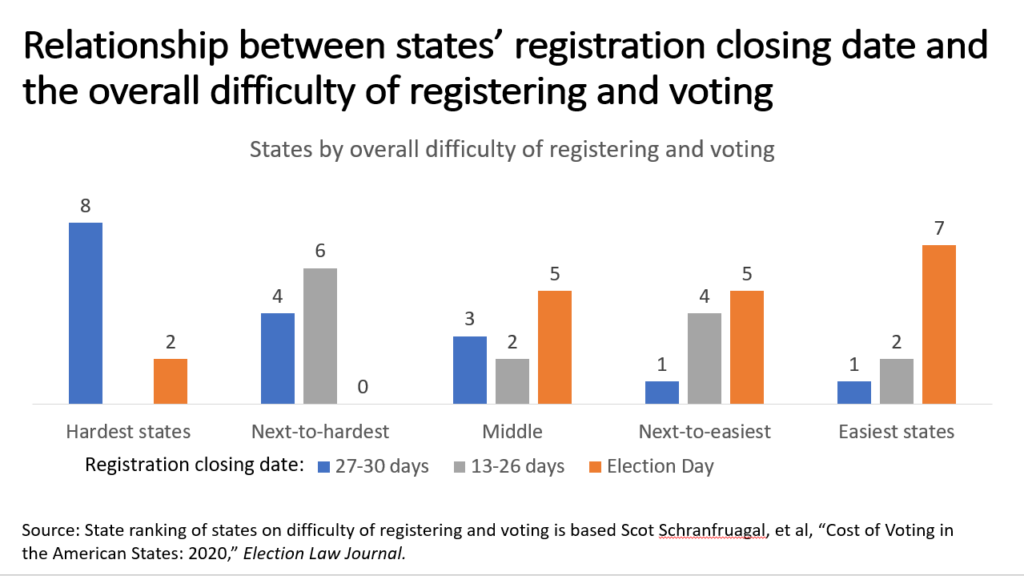This column about voter registration deadlines is an updated version of a column that appeared on The Journalist’s Resource in 2022.
In most Western democracies, voter registration takes place automatically through the government. France is one of the few that, like the United States, require citizens to initiate their registration. But France has one thing the United States does not have, and it helps tardy citizens to remember to register in time — a uniform national registration date. News outlets throughout France highlight the pending closing of the registration rolls.
Registration deadlines in the U.S. are a patchwork of state deadlines. They come and go with little fanfare from election officials and not much more from the news media. Not surprisingly, research has found that few Americans know their state’s registration deadline, although the number jumps up in the states where it’s easiest to remember — those that allow residents to register at the polls on Election Day.
The ongoing partisan struggle over ballot access deserves the press’s attention. So, too, does the date on which states close their registration in advance of Election Day. States are prohibited by the 1993 National Voter Registration Act from closing their rolls sooner than 30 days before a federal election. That period begins tomorrow, and registration in some states will close soon.
Officials in states with early closing dates say that it’s necessary because of the paperwork required. The claim made some sense in the age of paper. It makes no sense in the digital age. The dozen-and-a-half states that allow Election Day registration manage the process quite well.
Historically, early closing dates were designed in part to suppress the turnout of poor people, minorities and naturalized citizens. For a variety of reasons, including the more frequent change of residency, they were less likely to be on the voting rolls.
Voter suppression continues to underlie early closing dates in some states. States with the earliest closing dates tend also to be the states that otherwise make it harder for residents to vote — for example, by restricting early and mail-in voting.
Does it make a difference? Although other factors also need to be taken into account, states with early deadlines have voter turnout rates that are more than 10 percentage points lower on average than states that employ same-day registration.

A list of voter registration deadlines in the U.S.
The closing date in many states for voter registration is fast approaching. Following is a list of the states’ closing dates for in-person registration, which, in many cases, is also the deadline for postal and online registration.
Oct. 4
South Carolina.
Oct. 6
Alaska, Rhode Island.
Oct. 7
Arizona, Arkansas, Florida, Georgia, Indiana, Kentucky, Louisiana, Mississippi, Ohio, Tennessee, Texas.
Oct. 9
Missouri.
Oct. 11
Oklahoma.
Oct. 12
Delaware.
Oct. 15
Kansas, New Jersey, Oregon, West Virginia.
Oct. 21
Alabama, Pennsylvania, South Dakota.
Oct. 25
Nebraska.
Oct. 26
Massachusetts, New York.
Nov. 2
North Carolina.
Nov. 5 — Election Day
California, Colorado, District of Columbia, Hawaii, Idaho, Iowa, Maine, Maryland, Michigan, Minnesota, Nebraska, Nevada, New Hampshire, New Mexico, North Dakota, Utah, Vermont, Washington, Wisconsin, Wyoming.
The news media have a role to play in ensuring that Americans get a chance to vote. They could do more to tell citizens when and how to register. Research indicates that large numbers of the unregistered are unaware of where to go to register, when registration offices reopen, or what they need to bring with them as proof of eligibility. If there’s space in the news for yet another opinion poll, space can be found to alert Americans to registration deadlines.
Further reading:
Thomas E. Patterson. “The Vanishing Voter,” 2002.
Alex Street, Thomas A. Murray, John Blitzer and Rajan S. Patel. “Estimating Voter Registration Deadline Effects with Web Search Data,” Political Analysis, 2015.
Scot Schranfruagal, et al., “Cost of Voting in the American States: 2020,” Election Law Journal, 2020.


Expert Commentary